It is not a secret that breakfast is the most crucial meal of the day since the calories you take in the morning give you the necessary energy to begin the day. Individuals often underestimate the importance of calories in breakfast by either not eating breakfast or consuming excessive quantities of it.
In case you can identify the necessity and the number of calories that should be consumed, it can do you a lot of good. Therefore, this article will guide you through the number of calories a breakfast should have. Moreover, you'll learn how to plan a balanced breakfast every morning.
In this article
Part 1. Why Do Calories Matter at Breakfast?
The following section explains why breakfast calories are so important and how they impact energy, metabolism, and overall health across various groups.
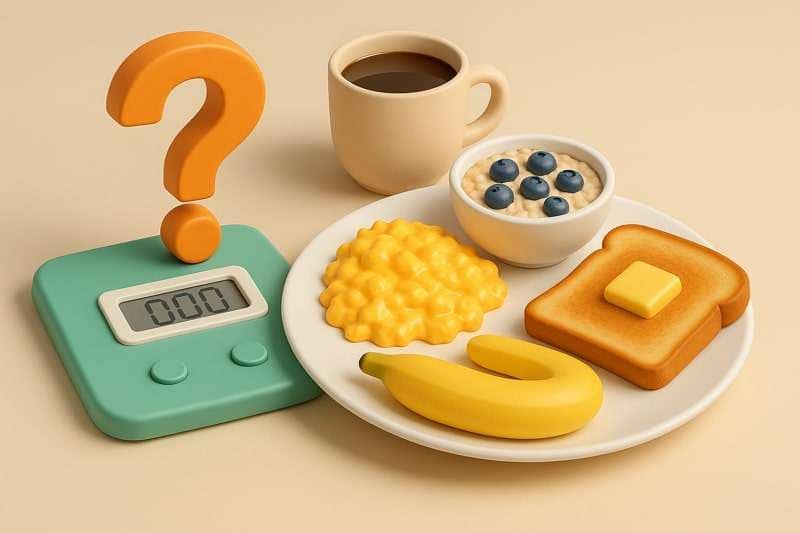
- Health Benefits: Consuming calories in the morning helps your body stay in sync with its internal clock, promoting efficient digestion and overall well-being. So, having breakfast improves digestion and retains low levels of hunger hormones.
- Energy Regulation: Research indicates that individuals who consume a balanced, substantial breakfast tend to feel more energetic throughout the day. Moreover, it helps control hunger levels and reduces the chances of overeating later.
- Daily Calorie Intake: Consuming a balanced breakfast with the correct calorie count can help users eat less later in the day. Moreover, individuals who don't have their daily breakfast intake tend to experience ber cravings and are more likely to overeat at night.
- Weight Management: With daily breakfast, you'll have a lower body mass index and are less likely to be overweight. Furthermore, these individuals consume less fat and have a more balanced nutrient intake than others.
- Balanced Lifestyle: Maintaining a regular breakfast habit encourages healthier lifestyle choices and consistent physical activity. Individuals who choose balanced meals are less likely to overeat and can effectively reduce the risk of various health issues.
Part 2. How Many Calories Should a Breakfast Be? Recommended Calorie Range for Breakfast
The following table helps you understand the ideal breakfast calorie range tailored to different age groups and lifestyle needs:
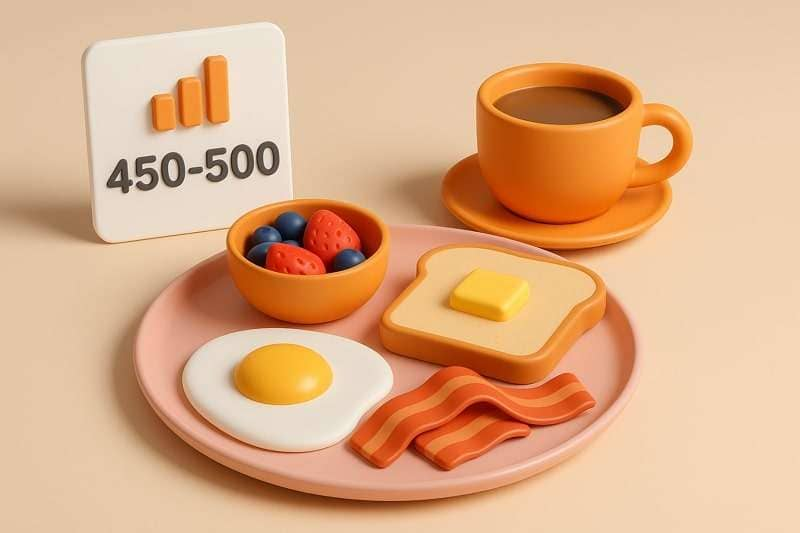
| Groups | Typical Daily Calorie Needs (kcal) | Breakfast Range (20-25% of Daily Needs - kcal) |
| Children (4-12) | 1,400–2,000 | 280–500 |
| Teenagers (13-18) | 1,800–2,800 | 360–700 |
| Young Adults (19-30) | 2,000–3,000 | 400–750 |
| Adults (31-60) | 1,800–2,600 | 360–650 |
| Older Adults (61+) | 1,600–2,200 | 320–550 |
| Pregnant Individuals | + ~300/day | ~440–600 |
| Breastfeeding Individuals | + ~330–400/day | ~480–675 |
| Athletes | 2,500–4,000+ | 500–1,000 |
| People with Diabetes | Personalized by dietitians | Usually 20–30% of daily intake with consistent carbs |
| People Recovering from Illness | Often increased | 400–700 |
Part 3. How Many Calories Should Be Consumed for Breakfast? Healthy vs. Low-Calorie Breakfasts
To make better food choices, learn the key differences between a healthy breakfast and a low-calorie breakfast in the table below:
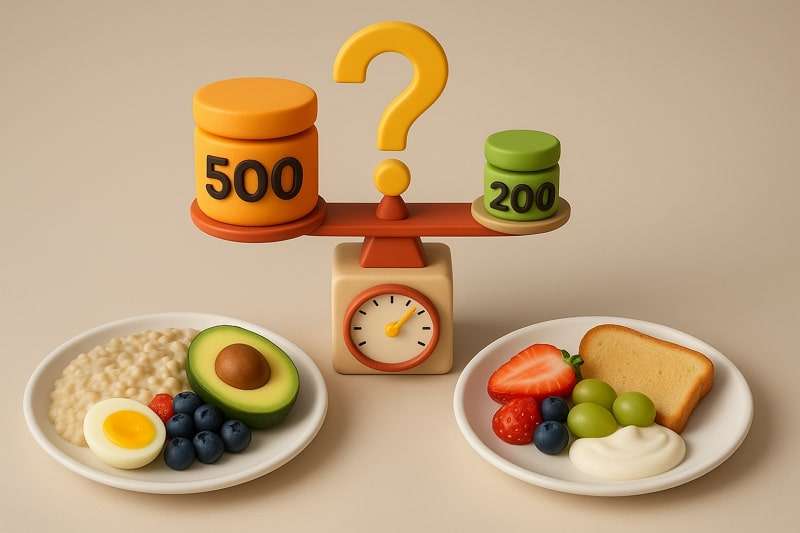
| Aspects | Healthy Breakfast | Low-Calorie Breakfast |
| Calorie Range | 300 - 500 kcal | 150 - 350 kcal |
| Macronutrient Balance | Provides a balanced mix of complex carbs, protein, and healthy fats | Focuses on reducing calories while ensuring adequate protein and fiber |
| Glycemic Impact | Complex carbs for steady blood sugar | Low glycemic load to prevent spikes |
| Sustainability | Supports long-term metabolic health | Requires careful planning to avoid nutrient gaps |
| Behavioral Aspects | Promotes consistent habits and enjoyment | Risk of cravings or overeating if too restrictive |
| Food Examples | Oatmeal with nuts, Greek yogurt & berries, and avocado toast with eggs | Spinach & egg white scramble, protein smoothie, and cottage cheese with fruit |
Part 4. 5 Tips & Tricks for Building a Satisfying, Nutritious Breakfast
Users can learn to balance their breakfast and how many calories breakfast should be by following these tips and tricks:
1. Good Source of Protein
Protein is another nutrient that is very significant in breakfast since it assists your muscles in repairing and developing. High-protein foods, such as eggs and tofu, can help build muscle and keep you full, preventing unnecessary snacking later in the day. Moreover, eating eggs or tofu in the mornings helps one manage hunger and lose weight.
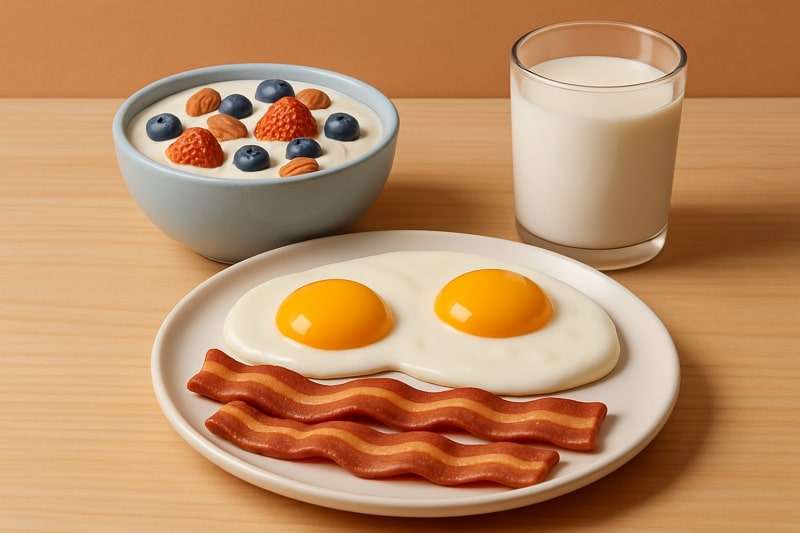
2. Grainy Breakfast
It is a well-known fact that whole grains are healthier than refined grains, including options like oats, whole wheat bread, and brown rice. They digest slowly, keeping blood sugar levels stable while their fiber supports better digestion. In contrast, refined grains such as sugary cereals and white bread offer a quick energy boost but often lead to a sudden energy crash afterward.
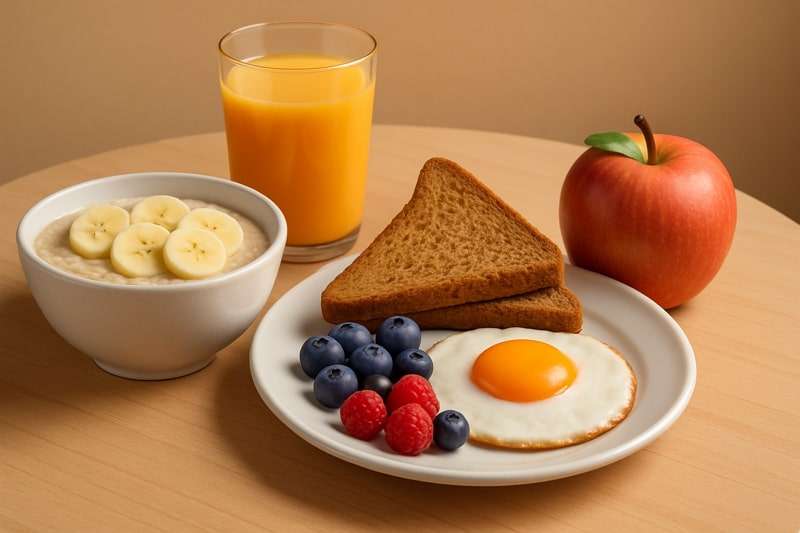
3. Add Fruits and Vegetables
People need to learn how many calories a breakfast should be while considering essential fruits and vegetables. They add color and flavor to the breakfast and help the body function properly. Try adding berries or banana slices to your smoothie as a healthy breakfast choice. This tip makes your breakfast stand out and enjoyable with enhanced nutrients and calories.
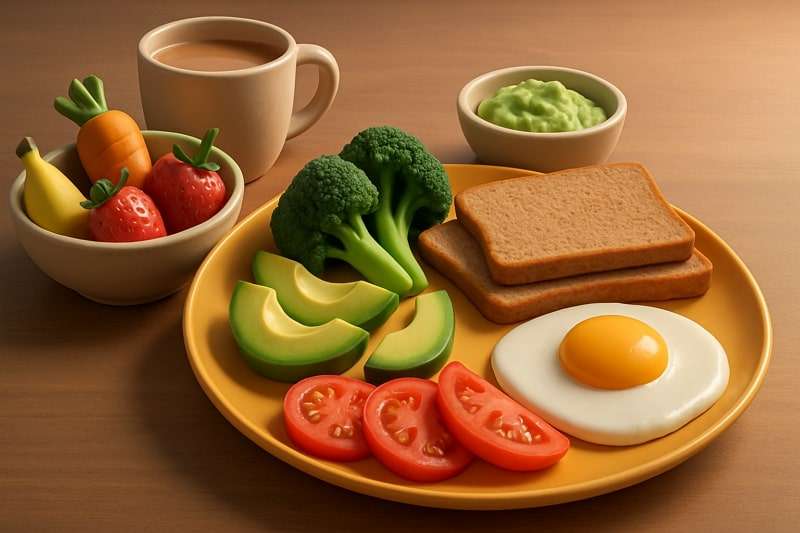
4. Limited Sugar Intake
Breakfast foods that should be limited include sweetened cereals, flavored yogurts, and pastries, as they cause sudden energy spikes and drops. Instead, opt for natural alternatives, such as fruit juice without added sugar or a small amount of honey for sweetness. You can also enhance flavor naturally with vanilla extract or cinnamon. Maintaining moderate sugar levels in both children and adults also supports steady energy throughout the day.
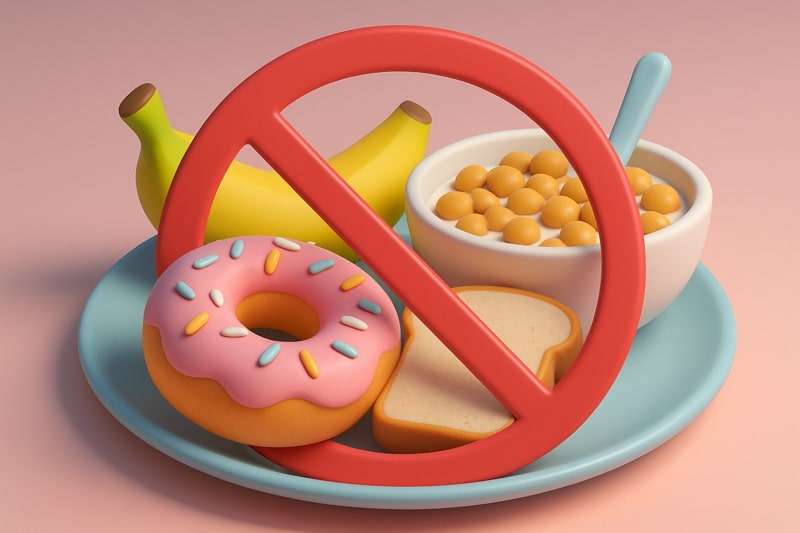
5. Use Calorie-Counting Tools
One of the best ways to determine how many calories a breakfast should contain is to use an efficient AI calorie counter app, such as CalBye (Android/iOS). With its instant food recognition technology, this app instantly identifies the estimated calories present in each dish. Moreover, you can even use the barcode or text analysis feature to scan the labels and get precise nutrient details.
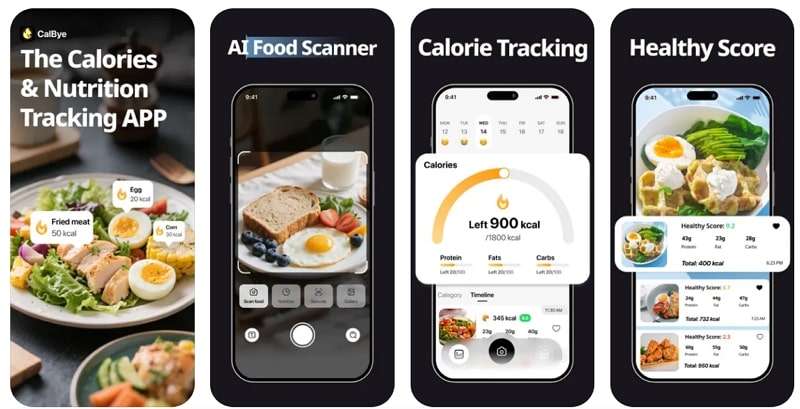
You can never forget, as this app also features a weight tracker that lets you log your progress and helps you stay consistent. Not only that, but it also offers a set of timely reminders and notifications, designed to fit your lifestyle. Users can access a comprehensive nutrient tracking system, ideal for those interested in fitness and muscle building. Therefore, start your journey today with this app's innovative features and get a competent food specialist.
Key Features
- Personalized Nutrition Guidance: This app enables users to align their meals with their goals and suggests alternative healthy habits.
- Weight Tracking: You can log your weight progress to track how you want to gain or lose it, creating a trendy weekly or monthly plan.
- Achievement Badges: After conserving or holding on to the sugar, this app celebrates your achievement by rewarding you with collectible badges and a pin.

Comprehensive Guide on How to Count Calories Using CalBye
Now, let's go through the following steps and understand how to intake the calorie count of your breakfast in seconds:
Step 1. Open the CalBye Scan Meal Feature
On the app, choose "Add Breakfast" from the "Just Scan Your Last Meal to get Going" options, and tap "Scan Meal."
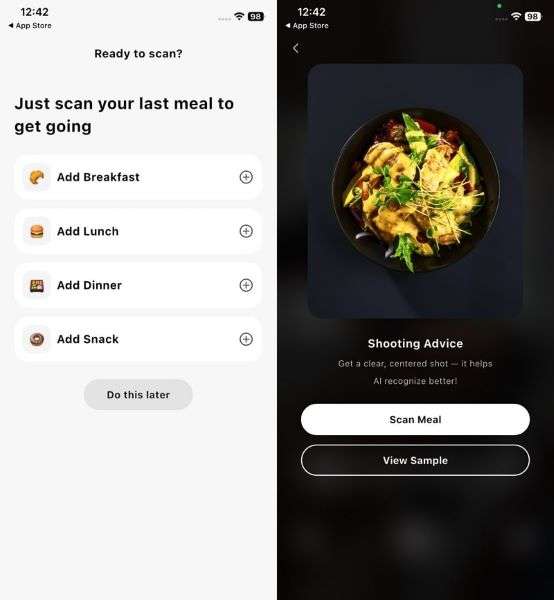
Step 2. Capture the Breakfast for Scanning
Next, select the "Scan Meal" option, capture your breakfast, and let the food processing begin.

Step 3. Review the Calorie Count of Your Breakfast
Once completed, go through the calories, values, and "Dietary Advice" for your breakfast in detail. If you are satisfied with the results and want to save them, press the "Log it" button.
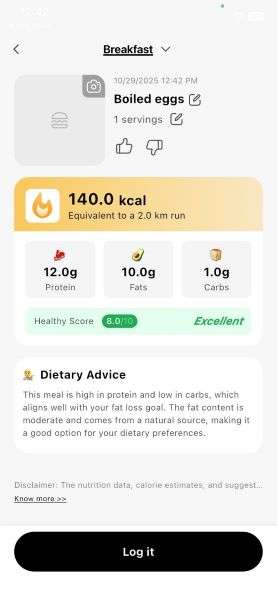
Conclusion
In conclusion, this article highlights the number of calories a breakfast should include and how it supports lasting energy throughout the day. Each age and lifestyle group, from children to older adults, has specific calorie needs outlined in the detailed table. By following the shared tips and using the CalBye app to track their intake, users can create a balanced and satisfying breakfast that aligns with their health goals.

FAQs
-
Can skipping breakfast affect my metabolism or weight?
When an individual misses breakfast, the body responds by conserving energy and adjusting its metabolism. After it, it may also lead to overeating or poor food choices. -
How can I create a nutrient-rich breakfast while controlling my calorie intake?
You should focus on consuming good protein foods, high-fiber whole grains, and minimizing your intake of sugar and refined carbohydrates. It is recommended to use apps like CalBye to track calories and nutrients efficiently. -
What role do calories at breakfast play in managing specific medical conditions?
The calories in breakfast can affect the blood sugar levels of diabetes patients; therefore, patients are advised to have a balanced meal. The quality of calories will help with symptoms and prevent complications in cases of kidney or heart disease. -
Does eating breakfast reduce calorie intake later in the day?
Our brain is associated with reward and impulsive behavior, which are influenced by eating breakfast. However, it does not guarantee a lower calorie intake, and it ultimately comes down to making good food choices.






